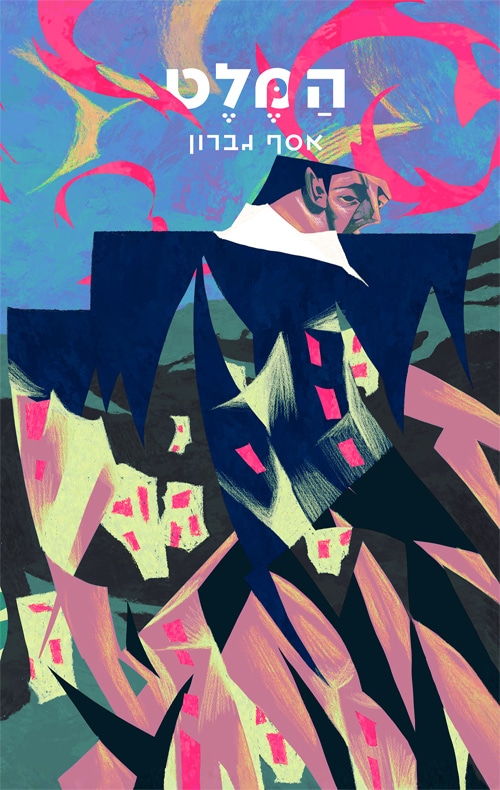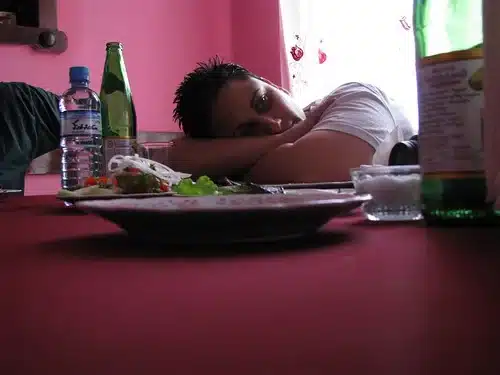"הַמֶלֶט" היא אחת מארבע נובלות במייזם פוסטקפ של מכון וון ליר. על המייזם המעניין ניתן לקרוא בקישור הבא: קליק.
פוסט- קפיטליזם כשמו כן הוא: הסדר כלכלי הנגזר מקפיטליזם. המייחד את הסדר זה הם שני תהליכים שצירופם מוביל להסדר חברתי כלכלי שוויוני וצודק יותר:
התהליך הראשון הוא האצה טכנולוגית המובילה ליתירות העבודה האנושית. תהליך זה מוביל בהכרח להרחבת שעות הפנאי של האדם וגידול תוחלת החיים שלו.
התהליך השני כרוך במשברי אקלים ואסונות אקולוגיים שחייבו את בני האדם להגירה והתארגנויות במבנים חברתיים חדשים הגוברים על ההסדרים לאומיים ומדינתיים וכן על הסדרים של קניין ובעלות פרטית. ביטול ההסדרים הקיימים, הלאמת המשאבים הסביבתיים והמשאבים שבבעלות פרטית בידי ישויות "על" מאפשרים מחד פרנסה לכלל החברים בקבוצה, מאידך הם מתחשבים בסביבה ובמגבלות ניצול המשאבים של כדור הארץ.
"המלט" עוסקת בשני ההיבטים של התהליכים המובילים לפוסט-קפיטליזם.
השם של הנובלה מרפרר להמלט של שייקספיר וניתן למצוא הרבה קווי דמיון בינהם. בעיקר הדמיון התמטי חזק מאוד : כמו המלט של שייקספיר, הנובלה עוסקת בנקמה. שניהם סיפורים משפחתיים העוסקים ביחסי כוחות ובתוצאות של אותה הנקמה.
לטעמי זו הנובלה הטובה ביותר בסידרת פוסטקפ. היא מבריקה ומאוד נהנתי בזמן קריאתה.
הַמֶלֶט מספר את סיפורה של משפחת אלאלוף. אבי המשפחה המציא תערובת מלט ייחודית המאפשרת הקמה מהירה של מבנים. ההמצאה הזו וביחוד העיתוי שלה, איפשרו למשפחה להתעשר ולהרחיב את העסקים למדינות בשותפות גדות הירדן, שמקיפה את מדינות המזרח התיכון החדש (שכולל את ישראל, פלסטין, ירדן וחלקים מלבנון וסוריה) וכן למדינות במפרץ הפרסי.
עמי, עובד בחברת הבניה של אביו. הוא עובד בפרויקט במפרץ הפרסי כאשר הוא נקרא לחזור לדימונה בדחיפות לאחר שאביו נפל למשכב באופן פתאומי. כאשר עמי מגיע, הוא מוצא את אביו במיטה חסר יכולת תנועה ו/או דיבור. נראה שמצבו בלתי הפיך וכי הוא גוסס.
בזמן שהותו בבית הוריו, עמי מבחין בשינויים המתרחשים בתוך המשפחה. אימו מתרחקת מאביו ומתקרבת לדודו, דקל, אחיו של אביו. היא מתרועעת ומסתודדת עם דודו, שתמיד שאף להשתלט על החברה.
ככל שחולף הזמן, עמי חושף את המזימה שרקמו בני המשפחה בשותפות עם שני חבריו הטובים והוא מתלבט מה היא הדרך הנכונה לטפל במזימה זו.
על רקע עקרונות הפוסט קפיטליזם רוקם הסופר עלילה מלאה בתככים, קנוניות, מזימות ובגידות.
דקל ואמו של עמי עושים יד אחת כדי לתמרן את המשטר השיתופי ולהשאיר את החברה בידיי המשפחה בזמן שאביו של עמי, דווקא היה בעד העקרונות השיתופיים ורוצה לחלק את ההון. העימות בין שתי תפיסות עולם מגיע לשיאו כאשר אביו של עמי נופל למשכב במצב של צמח ועמי עצמו נמצא בתווך בין התפיסות.
הוא גם בתווך בין תפיסת העולם שאוחזת בעבודה היא כל חיינו, לתפיסת העולם שבה הפנאי וזמן פנוי מייצר אנשים בריאים, יצרניים, שמחים ושוחרי שלום.
לעמי יש קושי מהותי עם תפיסת הפנאי של הפוסט קפיטליזם ומבחינתו זוהי אבן נגף המשמעותית. אמנם ישנן טרדות נוספות שמעסיקות אותו כמו גיל הבגרות (45) והעובדה שיידרש לכלכל את עצמו וגם לרכוש דירה, אבל הדאגה האמיתית שלו כרוכה בהתנתקות שנכפתה עליו ממשטר עבודת הכפיים.
כאמור הנובלה עצמה מבריקה וההקבלה לשייקספיר מלווה בקריצה וחיוך : לחבריו הרשעים של עמי קוראים גולדשטיין ורוזנברג, והם עורכי דין.
את יועץ המלך פולוניוס מחליף היועץ העסקי של המשפחה, פולנסקי. פולוניוס מתחבא מאחורי שטיח, פולנסקי מאחורי וילון.
בנו אלאור מצטייר כ- לארטס בנו של פולוניוס וסצנת הדו קרב עם סכיני מטבח היא גאוניות צרופה ומענגת.
העלילה אמנם אינה מתרחשת בדנמרק, אבל היא מתרחשת בדימונה בסביבות כיכר "דנמרק" ובניגוד למחזה של המלט, אף אחד לא מת בעלילה.
אם כבר לקרוא על פוסט קפיטליזם, אני ממליצה בחום לקרוא את הנובלה "הַמֶלֶט".
המלט/ אסף גברון
הוצאת פרדס, 2023, 154 עמ'
דירוג SIVI –
איכות אודיו –

פוסטקפ #
לדף הסידרה –
"Hamelet (The Cement)" is one of four novellas in the Van Leer Institute's Postcap project. You can read about the exciting project at the following link: click.
Post-capitalism, an economic order derived from capitalism, is distinguished by two processes that lead to a more equitable and just social arrangement.
The first step is technological advancement, which results in the automation of human labor. This process leads to an increase in leisure time and life expectancy.
The second process refers to the impact of climate crises and ecological disasters that have caused people to migrate and form new social structures. These structures are designed to override national and state arrangements as well as property and private ownership arrangements. As a result, existing arrangements are canceled, and environmental resources and resources privately owned by "super" entities are nationalized. This move provides a livelihood for all group members while also considering the environment and the limitations of the Earth's resources.
"Hamelet" explores the various processes that contribute to the emergence of post-capitalism.
The novella's title references Shakespeare's famous play "Hamlet". There are many similarities between the two works, particularly in their themes. Both are centered around revenge and explore power dynamics within families. They also delve into the consequences that can result from seeking revenge.
This is the best novella in the Postcap series. It is brilliant, and I enjoyed reading it.
The story of Hamelet revolves around the Alalof family. The father invented a unique cement mixture that enabled the rapid construction of buildings. Thanks to this invention and its timing, the family became wealthy and expanded their business to the countries in the Jordan Bank Partnership. This partnership includes the countries of the new Middle East, which consists of Israel, Palestine, Jordan, and parts of Lebanon and Syria, as well as the countries in the Persian Gulf.
Ami works in his father's construction company. He is currently working on a project in the Persian Gulf. However, he receives an urgent call to return to Dimona as his father has suddenly fallen into a deep sleep state and cannot move or speak. When Ami arrives, he finds his father in bed, and it appears that his condition is irreversible and that he is dying.
While Ami was staying at his parent's house, he noticed changes in the family dynamics. He observed that his mother started distancing herself from his father and getting closer to his uncle, Dekal, his father's brother. Ami's mother began socializing and hanging out with Dekal, who had always wanted to take over the family business.
As Ami uncovers the plot hatched by family members and his two best friends over time, he ponders how to handle it.
Amidst post-capitalism principles, the author crafts a story filled with intrigue, conspiracy, and betrayal.
Dekal and Ami's mother conspire to manipulate the cooperative regime and retain control of the family's business. However, Ami's father supports the cooperative ideology and wishes to divide the assets. The conflict between the two opposing viewpoints culminates when Ami's father falls into a vegetative state, leaving Ami caught in the middle of the dispute.
He is caught between a worldview that holds work as the core of life and a worldview that promotes leisure as essential for healthy, productive, and happy people.
Ami struggles to understand the idea of leisure in a post-capitalist society, which is a significant obstacle for him. Despite other concerns like the age at which he will graduate (45) and the need to support himself and buy an apartment, his main worry revolves around breaking free from the manual labor routine that has been imposed on him.
The novel is cleverly written and includes a nod to Shakespeare with Ami's scheming lawyers friends, Goldstein and Rosenberg.
Polanski replaces King Polonius' advisor, and both hide – Polonius behind a carpet and Polanski behind a curtain.
Laertes, son of Polonius, is portrayed as Elor, and the knife fight scene is a stroke of pure and delightful genius.
Although the story takes place in Dimona's "Denmark" Square, unlike Hamlet's play, no one dies in the plot.
If you're interested in reading about post-capitalism, I highly recommend checking out the novel 'Hamelet'.
לגלות עוד מהאתר Sivi's Books
Subscribe to get the latest posts sent to your email.

